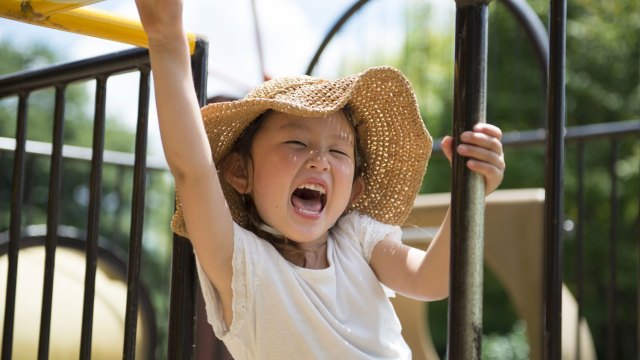We all know that kids playing outside is a good thing (and a bonus when you’re trying to get dinner on the table). They return from their forest frolics and playground romps with rosy cheeks and big smiles. Have you ever wondered why? To get to the bottom of this mystical transformation, we sat down with three experts to suss out the benefits of outdoor play. Read on to shed some light on the topic.
1. It improves focus.
Parents, raise your hand if you’ve ever mistaken your kiddo for the Energizer bunny because they’re always on the go. As Megan Fitzgerald, the Co-Founder and Chief Learning Officer at Tinkergarten explains, this need to move has to do with kids’ developing sensory systems. They’re learning to take in information and integrate it. And when it comes to stimulating environments, the ever-changing outdoors provides that just-right balance that kids need—not too much and not too little stimulation.
Fitzgerald points out that both kids' proprioceptive system (our sense of body awareness that plays an important regulatory role) and vestibular senses (related to balance and our sense of spatial awareness) are fully engaged in outdoor play. Whether they’re on the playground or walking along a trail, kids are doing the hard work of moving their bodies (think jumping, pushing, bending, swinging), which means both of these ultra-important systems are activated. The result? Those systems get turned on, so kids are better able to focus.
2. It encourages creativity.
If you’ve ever seen your kiddo turn a simple stick into a magic wand, bake a pinecone pie or jump from rock to rock to avoid the “lava” below, you know how imaginative they can be. When kids spend time in nature, they’ve got lots of room (both literally and figuratively) to imagine and create. Beyond proving just how adorable our kids are, creative play is important to their development. According to Fitzgerald, spending time outside promotes the kind of flexible thinking that helps kids generate new ideas. That’s why that simple stick can be a fishing pole, a knight’s sword or a pencil that makes amazing dirt drawings. The possibilities are endless—and that's the point.
3. It engenders empathy.
Alongside all this creativity that comes from imaginative play, kids can explore empathy through it too. As it turns out, fresh air and blue skies are the perfect backdrops for this type of learning. By pretending to be that bee flying from flower to flower or a squirrel chasing another around the yard, kids make a connection with the animal they're pretending to be, according to Fitzgerald. And oh, the things they’ll think of when they do! Imagining the experiences of other creatures, especially those smaller than themselves, builds cognitive empathy in kids. It helps them understand different emotions and recognize them in other people. And most importantly, Fitzgerald notes, it leads them to care for and about others.
4. It cultivates curiosity.
If you've got kids, you know how much they love to ask, “why?” As in, "why is the sky blue?" "Why can’t I do that?" "Why are you so tired all the time?" (We think we know the answer to that one). When kids play outside there’s a lot of natural wonder and curiosity around them.
Leah Carlson with the Wilderness Awareness School in Duvall, Washington sees the effects of time spent outside on kids’ curiosity every day. Often kids in the program create their own stories about what they see around them. And within those stories, kids learn to recognize patterns and ask important questions. They may notice animal tracks after a rainfall that weren't there before or that they can hear certain birds in the morning but not in the afternoon. Noticing these little differences (or similarities) leads them to formulate questions and develop ideas of their own. In other words, they get to both ask and answer their own "why" questions.
5. It improves mood.
Maybe it’s the fresh air. Maybe it’s the vitamin D boost that comes with playing on a sunny day. Or maybe it’s the endorphins from all that exercise they’re getting. Whatever it is, all three of the experts we spoke to emphasized that time spent outside improves mood. According to Derrick Soong, MD, FAAP with Virginia Mason Medical Center in Issaquah, Washington, playing outside “helps to improve mood” with the bonus of “reducing the risk/severity of depression and anxiety.”
Another part of that mood elevation is the calming effect nature has on people, kids included. Remember that vestibular sense we mentioned earlier? Research has shown that when it’s activated (think: sliding, spinning, swinging) it helps to keep you calm. Calmer and happier kids? Count us in!
6. It builds problem solving skills.
When it comes to life skills, our kids can never have too many. The fact that they can build foundational problem solving skills while on a hike, riding a bike or climbing at the playground? That’s what we call a bonus. As Carlson explains, spending time in the outdoors connects kids to nature, community and themselves and can have a profound effect on the way they approach the unknown. It gives them the chance to plan, prioritize, try different solutions, even negotiate in a safe environment. In the end these skills leave kids more resilient for the future.
7. It encourages healthy habits.
As parents, we’re always trying to pass along healthy habits to our kids. It’s why we puree kale alongside their applesauce and sing Daniel Tiger’s greatest hits to our tantruming toddlers. Turns out that playing outside can pass along many healthy habits to our kids, too. As Dr. Soong explains, outdoor play “helps provide children with the exercise they need to maintain a healthy weight.” Playing outside is the ultimate stealth workout for kids. Whether they love playing soccer, hiking or surfing, outdoor play can help them stay healthy as they grow.
—Allison Sutcliffe
RELATED STORIES:
18 Places to Find Incredible Outdoor Art
